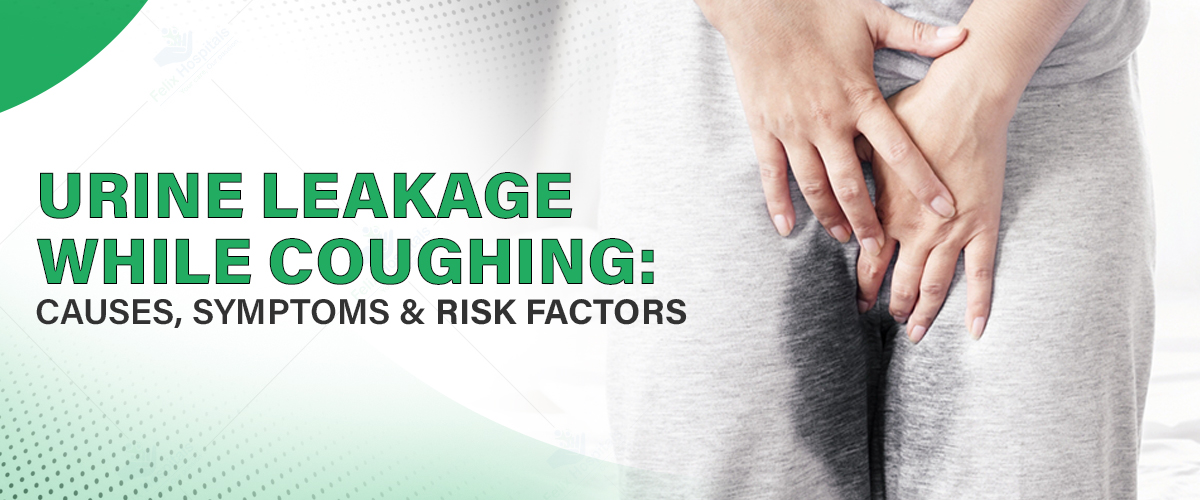
Subscribe to our

Some individuals, especially women, notice that while they cough, sneeze or laugh a little too hard, suddenly there’s a urine leakage. For some it's urine leakage while coughing in pregnancy, and for others, they experience it after they hit 40. This condition is commonly termed as stress urinary incontinence (SUI) and it affects more women than men. And no, it has nothing to do with emotional stress. It results when physical pressure gets applied to the bladder. While it can get embarrassing, the condition can improve significantly with the right treatment.
So let’s understand what causes urine leakage while coughing and why it happens to some and not others, and most importantly, what can be done to stop or prevent it.
Urinary incontinence can make a person feel embarrassed. Nevertheless, it is important to seek timely treatment. To consult our best Gynecologist in Noida, contact us!
Stress urinary incontinence occurs when the muscles that prevent urination are weakened by an action, such as a cough. You didn’t feel an urge, but your bladder didn’t hold. Basically, this type of leakage doesn’t give you a warning.
Urine is produced by the kidneys and stored in the bladder. The muscles surrounding the bladder help to keep urine in by tightening the urethra through which urine will pass. Once the bladder is full, the muscles surrounding the bladder contract and the urethra relaxes to allow the release of urine from the body.
Actions, such as coughing, can cause a sudden physical pressure on the bladder. This pressure can cause the pelvic floor muscles to relax momentarily, thus causing urine to leak through the urethra and out of the body.
It is possible for the pelvic floor muscles or the muscles surrounding the urethra to be damaged or weakened from the following:
● Pregnancy and Vaginal Delivery: Urine leakage while coughing in pregnancy is one of the primary causes of urinary leakage in women. During pregnancy, the muscles around your bladder stretch a lot. Delivery, especially vaginal adds more trauma. If the baby was big, or the labor was long, or you needed forceps, your pelvic muscles may have never fully recovered. Sometimes the nerves are affected too.
●Hormonal Changes: Estrogen plays a key role in keeping pelvic tissues strong and elastic. When women hit menopause, estrogen level drops. The urethra gets thinner, the tissues become more fragile, and the muscles can weaken too. That’s why many women start noticing leakage in their 40s or 50s.
● Ageing: As we age, muscles, including those in the pelvic floor, tend to weaken, which can contribute to increased urinary leakage.
● Chronic Coughing: Conditions that cause persistent coughing, such as chronic bronchitis or asthma, can exacerbate stress urinary incontinence by repeatedly increasing abdominal pressure.
Various factors increase your likelihood of weakening of the pelvic floor muscles, thus increasing the risk of stress urinary incontinence:
● Age: As you get older, your muscles, including your pelvic floor, lose tone.
● Multiple pregnancies: More deliveries mean more wear on those muscles.
● Obesity: Extra weight puts constant pressure on the bladder.
● Constipation: Straining all the time weakens the pelvic floor.
● Pelvic surgery: Hysterectomy or other procedures may alter bladder support.
● Family history: If your mom or sister had this, you might too.
● Pelvic Floor Exercises (Kegels): These exercises help strengthen the muscles that support your bladder. But you have to do them regularly and correctly. Some women see improvement in weeks, others need guided physiotherapy.
● Lifestyle Changes: Maintaining a healthy weight, treating chronic coughs, and avoiding bladder irritants like caffeine and alcohol can alleviate symptoms.
●Topical Estrogen: For postmenopausal women, low-dose estrogen cream (applied vaginally) can improve muscle tone and tissue quality.
● Surgery If nothing else works, effective surgical treatments, like laser therapy and surgical mesh implantation, are used to manage urine leakage during coughing. At Felix Hospital, the best hospital for pregnancy in Noida, these are usually day-care surgeries with a short recovery.
Here are some measures to prevent SUI:
● Stay active
● Do pelvic floor exercises early, not just after problems begin
● Maintain a healthy weight
● Avoid lifting heavy things without core support
● Get help for chronic coughs and constipation early
Urine leakage during coughing, over time, can mess with your confidence and freedom. Therefore, the sooner you seek medical advice, the better your chances of managing it fully.
At Felix Hospital, our experienced and best Gynecologist in Noida will conduct thorough assessments to identify the cause and will recommend the most appropriate treatment options. Early intervention leads to better management and improved quality of life.
Don’t wait for urine leakage during coughing to get worse. Early intervention leads to better management and improved quality of life. For consultation with our best gynecologist in Noida, contact us!
Q: Can young women have this problem of urinary leakage during coughing too?
Ans: Yes, urine leakage while coughing in pregnancy or after childbirth is very common. It should not be taken lightly and should be evaluated by a specialist. If you are looking for the best Gynecologist in Noida or to know our pregnancy treatment cost in Noida, contact us!
Q: Will reducing water intake help?
Ans: No. In fact, drinking too little can irritate the bladder. Balance is key.
Q: Do I need a doctor right away?
Ans: If you’ve been experiencing SUI for over a month or it is interfering with daily life, consult a specialist for better management.
Q: Is surgery the only way to treat SUI?
Ans: No, many women recover well with options such as exercise, lifestyle modification, and non-surgical options or medications.